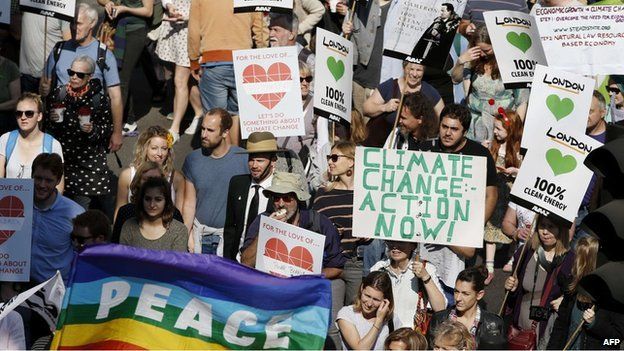Climate change: Thousands march across the UK
- Published

Thousands of people have taken part in a march for climate action in London - one of more than 2,000 marches which took place around the world.
Campaigners, including actress Emma Thompson and singer Peter Gabriel, marched along Embankment to a rally in Parliament Square.
Other marches in the UK took place in Manchester, Edinburgh, Sheffield, Stroud and Dudley.
Organisers said they expected more than 10,000 people to take part in London.
Co-organiser Avaaz later claimed at least 40,000 people had participated.
Meanwhile, at a rally in Manchester, close to the Labour Party conference, hundreds of campaigners called on party leader Ed Miliband to make a manifesto pledge to ban fracking.
The demonstrations come ahead of a summit on Tuesday for 125 heads of state and government at the United Nations headquarters in New York.
'Carnival atmosphere'
The London march began at 13:00 BST.
At 15:00 BST, the march was still more than a mile long, organisers told BBC News.
The rally heard from speakers including the Bishop of London, the Rt Rev Richard Chartres, and fashion designer Dame Vivienne Westwood.
Actress Emma Thompson told the rally: "Climate change is the human rights issue of our time.
"No more are we the grungy hippies sitting in trees. We are the voice of the future - if there is to be a future."
The BBC's Andy Moore said a vast coalition of interests had taken part in the London march - everyone from the Women's Institute to Occupy London, from the British Medical Association to Greenpeace and thousands of ordinary people.
Andy Moore reports from the People's Climate March in London
Earlier, Bert Wander, of campaign group Avaaz, told the BBC News website: "It's a really wonderful celebratory atmosphere here.
"It's like watching a carnival - there are giraffes and lions, snowflakes and families marching.
"We've got all the big organisations, Oxfam, the WWF but also organisations you wouldn't necessarily expect - the Quakers, all sorts of organisations and groups.
"I'm looking down Embankment and there are people as far as the eye can see."
'Social justice'
Meanwhile, members of Frack Free Greater Manchester were joined by Green Party leader Natalie Bennett and trade unionists in a rally near the Labour conference in March.
"It is really interesting that so many people here weren't even activists six months ago or involved in politics but more and more people are being energised saying we don't want fracking in our back garden or anywhere in Britain," Ms Bennett said.
The fracking process involves pumping water, sand and chemicals into rock at high pressure, and it has sparked demonstrations by environmentalists.
Critics argue that fracking contaminates water supplies and can cause earthquakes.
However, a government report published in June 2012 concluded that fracking was safe if adequately monitored.
In Newcastle, about 150 people marched from Newcastle's central library to the city's Civic Centre.
Universal agreement
BBC environment correspondent Matt McGrath said Tuesday's meeting would be the first such gathering since the unsuccessful Copenhagen conference in 2009.
The meeting will attempt to push forward political momentum towards a new universal agreement on climate to be signed by all nations at the end of 2015.
Tens of thousands of people joined a march in New York later.
UN Secretary General Ban Ki-moon and actor Leonardo DiCaprio were among those who joined the Manhattan demonstration.
Tens of thousands of people also took to the streets in Australia, while protests were also held in other parts of Europe.
- Published21 September 2014